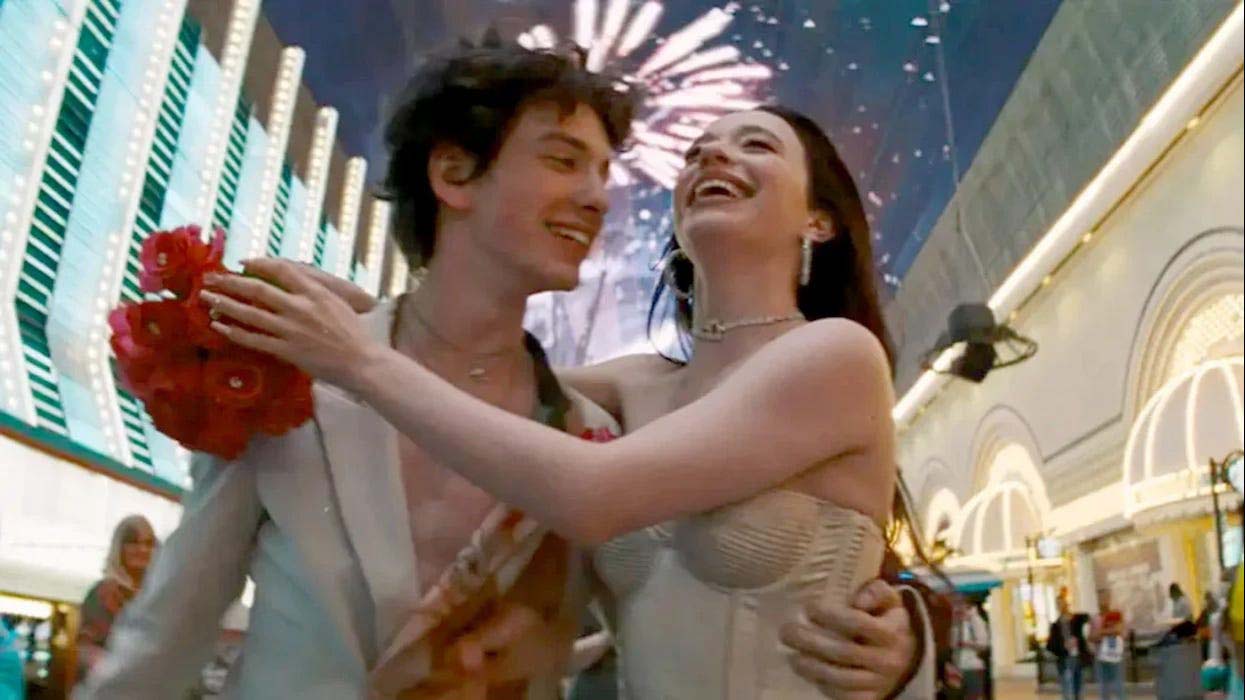- Film And TV
- 16 Aug 25
Love, Actually, Is Expensive: "Cultural narratives are increasingly alert to how money and gender intersect in intimate life"

Roe McDermott on romance, capitalism and the market value of desire.
“Nothing over 20 BMI.” “I wasn’t thinking 30s.” These are the criteria specified with unfiltered cruelty by male clients in The Materialists – Celine Song’s new romantic drama – to their professional matchmaker, Lucy.These demands, rife with dehumanising entitlement, jolt. Not necessarily because these attitudes are unrealistic, but because they’re stated so bluntly. But Celine Song didn’t have to invent much for this particular brand of cynicism, because the language of dating has long been infiltrated by the logics of the marketplace: value, competition, scarcity, supply and demand.
What The Materialists does, and what makes it stand out in the current wave of romantic storytelling, is not simply to show how modern love operates within capitalism, but to reveal how inextricable they have always been.
Lucy, played by Dakota Johnson, is a matchmaker for hire, pairing women – many of them edging towards 40, aware of what the culture tells them about time and desirability – with so-called “high value” men. It’s a job that requires instinct, salesmanship, and the ability to not judge her clients’ most base, materialistic desires.
Lucy manages it well, largely because she is open about her own unapologetic quest for money. She grew up poor, currently makes $80,000 while living in New York, and is determined to marry someone who can offer her the safety and stability of high earnings.
She’s terrified of being vulnerable in life, so she becomes invulnerable to love, instead treating marriage like a business investment. When Harry (Pedro Pascal), a charming, private equity type with a $12 million bachelor pad and John (Chris Evans), her broke wannabe-actor ex, both come into her life, the tension is less about which man Lucy will choose, and more about what kind of woman she’s allowed to be - and what she’s willing to trade to be her full self.
The romantic comedy has always danced on the tightrope between fantasy and social realism. From It Happened One Night to Pretty Woman, it’s a genre built on the promise that love can cross class lines, that desire can override social scripts.
We are in a moment when cultural narratives are increasingly alert to how money and gender intersect in intimate life. In Anora, Sean Baker’s Oscar-winning film, a Brooklyn stripper is swept into a whirlwind romance with a rich Russian heir. What begins as a transactional dynamic turns romantic – until it doesn’t. The question lingers: was it ever real? Or was it just the illusion of upward mobility, dressed up as love?

Anora
What’s shifted is how openly these ideas are now being named, both in art and in everyday discourse. Consider the depressing social media lexicon of “high value men and women” – viral terminology that strips romance of meaning and reframes it in stark, neoliberal, deeply gendered terms.
In this worldview, women must remain slim, submissive and fertile to attract a provider; men must be rich, emotionally unavailable, and “not chase”. TikTok is saturated with content teaching people to treat dating like job interviews, or marketplaces, treating themselves and romantic prospects like products. The language of love has been supplanted by the language of economics and branding.
This depressing ideological shift may just be the result of people desperately trying to survive in late-stage capitalism where most are struggling, but thanks to patriarchy, women are still more vulnerable than men. In real life, many people – especially women – stay in unhappy relationships because they cannot afford to leave. The cost of housing, childcare, or healthcare (depending on your geography) renders “choice” illusory. The romantic ideal of staying for love alone presumes a degree of privilege that many simply do not have.
What’s striking about The Materialists is how directly it engages with these contradictions. Song’s affection for the romantic comedy genre is evident, but so is her critique. The glossy surface – the flirtation, the music, the meet-cutes – is undercut by moments of genuine menace: a flash of misogyny, a hint of violence, a client’s indignation at being asked to consider a woman his own age. It’s not just awkward. It’s dangerous.
And yet, the film doesn’t entirely abandon the dream. There is romance here, as Song wants to see if the genre can survive this new awareness – if love can still mean something when it’s disentangled, however briefly, from capital.
That’s the question at the heart of this cultural moment. Can we love outside the logics of capitalism? Can desire be freed from hierarchy, from scarcity, from value judgements? Or is romance – like everything else – now another market to be optimised?
Art can’t answer that. But it can help us see the system more clearly. And maybe that’s where something like hope begins. Not in the perfect match, but in naming the terms of the deal, and choosing whether to accept them.
RELATED

- Film And TV
- 03 Mar 25
Oscars 2025: Anora dominates the Academy Awards with five wins, including Best Picture

- Film And TV
- 09 Dec 24
Colin Farrell and Andrew Scott nominated for 2025 Golden Globes
RELATED

- Film And TV
- 20 Jan 26
Dafne Keen and Aidan Gillen set to star in British crime romance film Driver

- Film And TV
- 20 Jan 26
Chris de Burgh to appear on Rivals

- Film And TV
- 20 Jan 26
2026 IFTA nominees announced, Christy and Saipan lead nominations

- Film And TV
- 19 Jan 26
Steve Coogan joins cast of The White Lotus

- Film And TV
- 19 Jan 26



